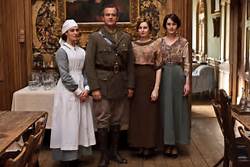Going back upstairs was like going into a different world.
The gentry lived a life of luxury with beautiful carpets, old wooden but exquisitely carved sideboards and 'comfortable' chairs. The rooms were large and there were many of them, especially if you included the bedrooms. Every room had an open fire-place --- the only way to heat the room back then. There were portraits of the family going back hundreds of years. Mirrors, vases, books, the list would be endless, as each object was handed down over the generations. I can imagine the sheer fear a new maid may have felt when having to dust a very old heirloom for the first time, or the nerves of the new footman holding a tray full of wine glasses, especially when the glasses are two hundred years old. This is the type of world society was born into --- the super-rich (gentry) and the servants (lower class). From the Lord right down to the kitchen maid --- each knew their place.
As has been touched upon, the wealthy Lady looked beautiful and seemed to have a life of ease when compared to the parlour maid, and yet even these Ladies had a role to play. Once married, these Ladies could not divorce (they would be shamed and rejected by their class if they did ). To be left a spinster was equally to be avoided. So often marrying for position or money, how many of these Ladies were truly happy ? Having servants around them all of the time, there was no privacy. Yes, these Ladies were born into wealth, which for most, was a very beautiful, gilded cage.
Once The Great War started, life changed dramatically, even for the gentry. It has often been said that the lazy days of picnicking in the gardens, shaded from the sun, sitting under a specially erected marquee, with servants toing and froing, were gone forever once the First World War started. The grand country houses of the rich were turned into hospitals for the sick and wounded soldiers, even as depicted in Downton Abbey. The gentry needed to be seen to be "doing one's bit" for their country and yet, it was like an invasion of privacy. These massive mansions were lived in homes after all !
The young Ladies got involved, either in nursing or in other ways. In the series, Lady Sybil trains to become a qualified nurse, whereas her sister, Lady Edith, appointed herself to caring for the morale of the wounded soldiers, helping them to write letters to their families, finding books for them to read out of the family library and even going to the village shops to buy things for the soldiers(cigarettes / sweets / etc). Two very different roles which started to break down the class barriers. Lady Sybil had to work alongside the servants being a nurse. Lady Edith going to the village shops like a servant.
It is interesting to note that soldiers from all walks of life were treated within these grand houses. Whilst the general may have been used to such magnificent surroundings, the working class chap must have had his mouth open at the sheer sight of it all. It must have looked "odd" too. Beautiful portraits on the drawing room wall when the room was filled with rows of hospital beds.
All of this shows us how and why life changed all those years ago. Although war of any kind is never a good thing to go through, I can't help thinking how much The Great War "helped" in breaking down, once and for all time, the class distinction --- the Lord fought alongside the footman / the Lady nursed alongside the maid.




No comments:
Post a Comment